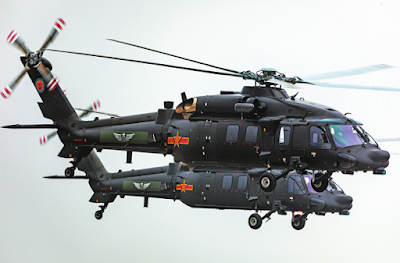The Good, Bad & Ugly of IAF: Looking into future.....
By: Kartikeya Semwal
With the
ever-increasing escalation by China on India’s eastern border, chances of India
fighting China in the near future cannot be ruled out. With the growing air-space violation
by Chinese helicopters & jets & the number of jets being regularly
being inducted by Chinese airforce, the need of having more & more
combat-capable jets is being felt by IAF (Indian Air Force).
Chinese choppers.
We all know that the induction of LCA Tejas is
going on and the 1st squadron of Tejas Mk-1 IOC variant has already
been inducted while induction of 2nd squadron having an improved Tejas
Mk-1 FOC variant has just started from 27 May 2020. The ‘good thing’ about
Tejas is that its second squadron will be complete (18 jets) in the next 12 to
18 months.
Tejas Mk-1.
But in order to meet the Chinese aerial threat,
IAF needs to induct more new jets & modify and upgrade the existing ones.
One such similar and much needed modification and upgrade project that IAF
wanted to carry out was equipping 80 Jaguar fighters with new powerful engines
produced by Honeywell company of England. The Jaguar modification programme also
included upgrading them with new avionics, 2nd generation AESA
radars, new EWS (Electronic Warfare Suite).
IAF's Jaguar.
All these upgradations would have turned Jaguars
into 4th generation combat jets. Another plus about those 80 jaguars
was that their airframes are just over 30% used, which means that they can be
operated till 2035-2040. That was the time by which Tejas’s Mk-2 variant would
have been developed and inducted into Indian Air Force in good numbers.
Upgraded Jaguar Darin-III.
The ‘bad thing’ is that this Jaguar upgradation programme has just been cancelled in the budget-restructuring process. And now they will be retired sooner than expected or much before their service life. The IAF top-brass thinks that instead, 83 Tejas Mk-1As will be developed and inducted to replace Jaguars. But this step comes with its own restrictions and will have an adverse effect on IAF’s fighting capabilities. With Jaguars removal, IAF will be without the much-needed teeth to carry out deep-penetration, bombing and anti-tank & anti-artillery warfare against the enemies on both- western & eastern fronts.
IAF's Jaguars in Arrowhead formation.
My opinion is that IAF should not cancel the Jaguar
upgradation programme & should continue with it. While on the other hand,
it should continue inducting Tejas Mk-1s & Mk-1As in a phased manner. This
will not only help in maintaining the required number of fighter squadrons but
will also enhance IAF’s deep-strike, bombing and anti-land warfare capabilities
by leaps & bounds.
Tejas Mk-1A Concept Design.
Now comes the ‘ugly side’ of the story. With delivery of all 36 Rafales to be completed only by April 2022 (which now might be delayed by 2-3 months due to Covid-19 outbreak that resulted in global lockdown) and Tejas Mk-2's 1st flight not happening before mid of 2023; IAF will be short of the required number of fighter squadrons needed to fight a two-front war.
F/A-18 Super Hornet Block-3.
To me, the only solution to this problem seems to
be- India should either buy or lease one of the following 2 jets- Boeing’s F/A-18
Super Hornet Block-3 or Lockheed Martin’s F-15E (latest variant of F-15) for atleast
10 years. This will give IAF time to acquire & operationalize Rafales as
well as 40 Tejas Mk-1s & the 1st squadron of Tejas Mk-1As by
2025; and all of 83 Tejas Mk-1As by 2029.
F-15E Strike Eagle.
If this step is taken keeping the future in
mind, the IAF will not only be able to pitch atleast 30-32 squadrons by 2030 but
also, fend off Chinese threat effectively. 










Comments
Post a Comment